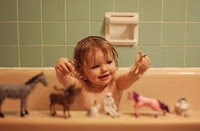Meal time is one of the most important times for families to
gather and grow together. From the birth
of your child to age 18, there are 6,570 dinner times! If you spend 30 minutes on dinner together
each day, you would have 3,285 hours of relationship building time! Carving out
that precious 30 minutes and making it sacred is difficult, but can reap a
mountain of rewards. Start when your
children are young and make it a consistent habit!
I found that having a set time for dinner helped everyone plan. When asked, “Can you go here at this time?” my children and spouse already knew the answer—“No, it’s dinner time!” There will be exceptions, for sure, but having a set time is important.
A great tool that many have shared is to circle around the
table letting each person tell about the worst and best thing that happened
that day. This gives great insight and
perspective as to what is important in each person’s life. If there are
concerns and issues, it might be a great time to pray for that!
 |
| Share Best and Worst |
When we were young my mother had a set of scripture verses
on cards that was kept on the dining room table. We would take turns reading the verse each
day and then discussing what it meant.
My husband and I initiated a great new idea called, “Conversation
starters” when we became a Host Family to two foreign exchange students from
China. To help them learn English and to
foster an atmosphere of conversation, I made a list of questions, printed them,
cut them apart, folded each paper and put it in a jar. We rotated who started
each day, but they had to select a paper, read it out loud, and be the first to
answer the question. Feel free to use some of my favorites or make up your own!
- · Describe one of your current or former pets.
- · Describe a family vacation you took: where did you go, what did you do, was it fun, who went, etc.
- · Tell us about your earliest memory.
- · Tell us about a time you spent with your grandparents.
- · What do you think is your best physical feature?
- · What do you think is your worst physical feature?
- · If you were a great photographer, what would you like to photograph?
- · What is the best Birthday you ever had? Describe it.
- · There are reportedly 10,425 species of birds. What is your favorite? Why do you think there are so many?
- · Describe your family.
- · Describe your home town.
- · Describe your home.
- · What is your favorite past time?
- · Sing us a song from your childhood.
- · What is your favorite movie that you could watch a 100 times?
- · What is the best food your mother makes?
- · Where do you think you will be in 20 years? What will you be doing?
- · What are you looking forward to this school year?
- · What is your best subject? Why?
- · What is your worst subject? Why?
- · What is your favorite sport to play?
- · What is your favorite sport to watch live or on TV?
- · If could play any musical instrument, what would it be?
- · What is your favorite song? Favorite artist?
- · If you could live anywhere in the world, where would it be?
- · What is your favorite dessert?
- · Who was your favorite/first teacher? Describe them.
- · Have you been to a Circus? What was your favorite act/show?
- · Tell us a time when you needed to learn a new skill (bike riding, a new game, an instrument, etc.)
- · Describe a “first”—subway ride, Day of school, time at a concert, first time away from home.
- · Tell us a joke.
- · What do you think happens when we die?
- · Who do you most admire?
- · Can you dance? Show us one of your moves!
- · Would you rather lose your vision/sight (be blind) or lose your ability to hear (become deaf)?
- · If you could go back to any period of time in history, when would it be? Why?
- · If you were asked to be the first astronaut to travel to Mars, would you do it? What would you take to keep yourself entertained on the journey?
- · If you worked at the zoo, what animal (s) would you like to care for?
- · What would be your first act if you were elected President?
- · What would your “Ideal Wife/Husband” look like? Physical characteristics, character, skills, etc.
- · Do you remember a time you were really sad? Can you tell us why?
- · Do you remember a time when you were really glad? Why?
- · Do you dream often? Can you recall a dream that you have had recently? Would you tell us about it?
- · What character trait would you like more of? How do you think that you could develop this trait in yourself?
- · Have you ever been really sick? What happened? How did you recover?
- · What would you do if someone gave you 200 million dollars today?
- · If you could travel anywhere, regardless of cost, where would you go? Why? Who would you take?
- · Do you have a favorite quote or saying? What is it?
Blog Administrator: Trisha Roberts
proeducationaltoys@gmail.com
Copyright © 2016 TNT Inspired Enterprise, LLC, All rights reserved.
Unauthorized duplication is a violation of applicable laws.





























